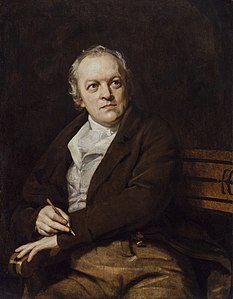Analysis of To the Evening Star
William Blake 1757 (Soho) – 1827 (London)
Thou fair-haired angel of the evening,
Now, whilst the sun rests on the mountains, light
Thy bright torch of love; thy radiant crown
Put on, and smile upon our evening bed!
Smile on our loves, and while thou drawest the
Blue curtains of the sky, scatter thy silver dew
On every flower that shuts its sweet eyes
In timely sleep. Let thy west wing sleep on
The lake; speak silence with thy glimmering eyes,
And wash the dusk with silver. Soon, full soon,
Dost thou withdraw; then the wolf rages wide,
And the lion glares through the dun forest.
The fleeces of our flocks are covered with
Thy sacred dew; protect with them with thine influence.
| Scheme | ABCDEFGHGIJKLM |
|---|---|
| Poetic Form | |
| Metre | 111101010 1101110101 1111111001 11010110101 1110101110 110101101101 11001011111 0101111111 01110111001 0101110111 1101101101 0010110110 01011011101 1101011111100 |
| Closest metre | Iambic pentameter |
| Characters | 636 |
| Words | 118 |
| Sentences | 6 |
| Stanzas | 1 |
| Stanza Lengths | 14 |
| Lines Amount | 14 |
| Letters per line (avg) | 36 |
| Words per line (avg) | 8 |
| Letters per stanza (avg) | 506 |
| Words per stanza (avg) | 116 |
Font size:
Submitted on May 13, 2011
Modified on April 17, 2023
- 35 sec read
- 263 Views
Citation
Use the citation below to add this poem analysis to your bibliography:
Style:MLAChicagoAPA
"To the Evening Star" Poetry.com. STANDS4 LLC, 2024. Web. 2 Jun 2024. <https://www.poetry.com/poem-analysis/39207/to-the-evening-star>.


Discuss this William Blake poem analysis with the community:
Report Comment
We're doing our best to make sure our content is useful, accurate and safe.
If by any chance you spot an inappropriate comment while navigating through our website please use this form to let us know, and we'll take care of it shortly.
Attachment
You need to be logged in to favorite.
Log In